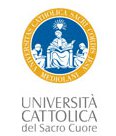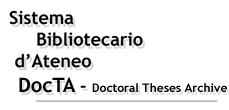|
|
DocTA - Doctoral Theses Archive >
Tesi di dottorato >
CORSO DI DOTTORATO IN SCIENZE DELLA PERSONA E DELLA FORMAZIONE >
Citazione:
Utilizza queste indicazioni per citare o creare un link a questo documento.
|
Frigerio, Carlotta. "L'INSEGNAMENTO ACCADEMICO DELLA PEDAGOGIA IN ITALIA DALLE ORIGINI AGLI ANNI SESSANTA DEL NOVECENTO: IDENTIKIT DEL PROFESSORE ITALIANO DI PEDAGOGIA NELLE UNIVERSITA' MAGGIORI", Università Cattolica del Sacro Cuore, XXXII ciclo, a.a. 2018/19, Milano, [http://hdl.handle.net/10280/97171].
|
| Titolo: | L'INSEGNAMENTO ACCADEMICO DELLA PEDAGOGIA IN ITALIA DALLE ORIGINI AGLI ANNI SESSANTA DEL NOVECENTO: IDENTIKIT DEL PROFESSORE ITALIANO DI PEDAGOGIA NELLE UNIVERSITA' MAGGIORI |
| Autore/i: | FRIGERIO, CARLOTTA |
| Tutor: | POLENGHI, SIMONETTA |
| Coordinatore: | MARCHETTI, ANTONELLA |
| Lingua: | ITA |
| Abstract in italiano della tesi: | Il progetto di ricerca che ha condotto alla stesura della mia tesi di dottorato si è posto come obiettivo principale quello di ripercorrere e analizzare la storia dell’insegnamento accademico della Pedagogia nei maggiori atenei italiani, partendo dal periodo preunitario fino ad arrivare agli anni Sessanta del secolo scorso, ricostruendo con esattezza la mappatura delle maggiori cattedre universitarie di Pedagogia, per evidenziarne la loro evoluzione e il loro sviluppo nel tempo.
Il primo capitolo di tale elaborato è suddiviso in tre parti: nella prima la ricerca indaga come la storia della Pedagogia accademica sia stata affrontata negli altri paesi europei, dove, ad eccezione dell’Austria con il monumentale lavoro di W. Brezinka, la situazione ricalca quella italiana; nella seconda parte vengono presentati i tre stati italiani preunitari che già proponevano nei loro atenei l’insegnamento della Pedagogia: ovvero il Regno sabaudo a Torino, l’Impero asburgico a Pavia e Padova e il Granducato di Toscana a Pisa; infine l’ultima parte propone un rapido inquadramento legislativo circa l’insegnamento della Pedagogia nelle varie Facoltà e nei differenti percorsi di studio. Il secondo capitolo rappresenta la parte più corposa di tutto il testo poiché passa al vaglio lo sviluppo e l’articolazione della disciplina nei dodici atenei presi in analisi, inquadrando brevemente anche i profili di tutti gli insegnanti incaricati della docenza; esso inoltre presenta anche un’iniziale analisi dei dati in ogni ateneo.
Con l’inizio del terzo capitolo il lavoro si concentra sull’analisi quantitativa e qualitativa dei dati raccolti. Esso riporta i grafici riassuntivi corredati da un commento critico degli aspetti indagati ritenuti di maggior importanza ovvero la provenienza geografica dei docenti, l’età dell’ingresso in cattedra, la formazione di ciascun professore, la tipologia d’incarico, i programmi delle lezioni e le correnti pedagogiche e filosofiche abbracciate da ciascun docente; infine il capitolo si conclude con la presentazione di un identikit del professore-tipo di Pedagogia in corrispondenza di quattro principali periodi storici: dall’Unità fino al 1880; dal 1880 alla fine del secolo, dal 1900 alla fine della Seconda Guerra Mondiale e dal periodo post bellico fino al 1960.
Da ultimo il quarto capitolo, sebbene abbia una lunghezza ridotta rispetto ai precedenti, consiste nella presentazione della realizzazione di un’applicazione web relativa alla ricerca. In essa è possibile consultare tutti i dati raccolti, ovvero sia l’elenco suddiviso per anni e per facoltà dei professori di Pedagogia nella Facoltà di Lettere e Filosofia, sia le schede biografiche di ciascuno, in modo che siano accessibili da remoto a chiunque ne abbia necessità.
Tale tesi è poi corredata da un’Appendice che riporta la schedatura dei numerosi dati raccolti.
In conclusione questa analisi a lunga durata ha reso possibile una mappatura storica e geografica circa le permanenze e le fratture che hanno caratterizzato l’insegnamento della Pedagogia accademica in Italia. La Pedagogia è stata per lungo tempo complementare alla Filosofia, inserita nella Facoltà di Lettere e Filosofia; solo nel 1934 è nata la Facoltà di Magistero, ma la disciplina ha mostrato ancora qualche difficoltà a scindersi dalle discipline filosofiche. Inoltre in principio Storia e Didattica della Pedagogia erano unite e il docente di Pedagogia padroneggiava tutto, bisognò attendere gli anni Settanta, con l’esplosione delle cattedre, per assistere alla separazione dei saperi.
Concludendo, questo lavoro vuole essere un primo passo nel tentativo di colmare una lacuna della storia della Pedagogia accademica italiana attraverso un’analisi comparativa globale. |
| Abstract in inglese: | The research project that led to the writing of my doctoral thesis had as its main objective that of retracing and analyzing the history of the academic teaching of Pedagogy in the major Italian universities, starting from the pre-unification period until the sixties of the last century, reconstructing with accuracy the mapping of the major university chairs of Pedagogy, to highlight their evolution and their development over time.
The first chapter of this work is divided into three parts: in the first one the research investigates how the history of academic Pedagogy has been approached in other European countries, where, with the exception of Austria with the monumental work of W. Brezinka, where the situation is similar to the Italian one; in the second part the three Italian pre-unification states that already proposed the teaching of Pedagogy in their universities are presented: that is, the Savoy Kingdom in Turin, the Habsburg Empire in Pavia and Padua and the Grand Duchy of Tuscany in Pisa; finally the last part proposes a quick legislative framework about the teaching of Pedagogy in the various faculties and in the different courses of study.
The second chapter represents the most substantial part of the entire text since it examines the development and articulation of the discipline in the twelve universities under analysis, also briefly framing the profiles of all the teachers in charge of teaching; it also presents an initial analysis of the data in each university.
With the beginning of the third chapter, the work focuses on the quantitative and qualitative analysis of the data collected. It shows the summary graphs accompanied by a critical commentary on the aspects investigated that were considered most important, that is, the geographic origin of the teachers, the age at which they entered the professorship, the training of each professor, the type of assignment, the lesson plans and the pedagogical and philosophical currents embraced by each teacher; finally, the chapter concludes with the presentation of a sketch of the typical professor of Pedagogy in correspondence with four main historical periods: Unification to 1880; 1880 to the end of the century; 1900 to the end of World War II; and the post-war period to 1960.
Lastly, the fourth chapter, although shorter in length than the previous ones, consists of a presentation of the creation of a web application related to the research. In this application it is possible to consult all the data collected, that is, both the list subdivided by year and by faculty of the professors of Pedagogy in the Faculty of Arts, and the biographical files of each one, so that they can be accessed remotely by anyone who needs them.
This thesis is then accompanied by an Appendix that reports the filing of the numerous data collected.
In conclusion, this long-term analysis has made possible a historical and geographical mapping of the permanences and fractures that have characterized the teaching of academic Pedagogy in Italy. Pedagogy was for a long time complementary to Philosophy, included in the Faculty of Arts; only in 1934 the Teacher Training Faculty was born, but the discipline still showed some difficulty in splitting from the philosophical disciplines. Moreover, in the beginning, History and Didactics of Pedagogy were united and the teacher of Pedagogy mastered everything; we had to wait until the Seventies, with the explosion of the number of chairs, to see the separation of knowledge.
In conclusion, this work wants to be a first step in the attempt to fill a gap in the history of Italian academic Pedagogy through a global comparative analysis. |
| Data di discussione: | 27-mag-2021 |
| URI: | http://hdl.handle.net/10280/97171 |
| È visualizzato nelle collezioni: | CORSO DI DOTTORATO IN SCIENZE DELLA PERSONA E DELLA FORMAZIONE
FACOLTA' DI SCIENZE DELLA FORMAZIONE
|
File in questo documento:
| File |
Dimensioni | Formato | Accessibilità |
|---|
| Tesi Dottorato Carlotta Frigerio.pdf | 34,35 MB | Adobe PDF | Visualizza/apri
|
|
Accesso e utilizzo dei contenuti di DocTA
|



